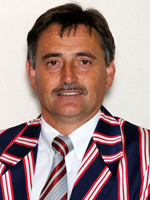
DB Prinsloo |
Director of KovsieSport, DB Prinsloo, was named as South Africa’s Coach of the Year. He is currently coaching the renowned Johan Cronjé – the best SA men’s athlete for 2013, member of the SA Commonwealth team for 2014 and a former Kovsie. Last year Prinsloo was also the team coach for the South African team that competed in Moscow at the world championships.
Several of South Africa’s leading athletes are trained by Prinsloo. Apart from the loads of medals his athletes won at national championships, he trained quite a few athletes who donned the green and gold. Boy Soke and Dumisane Hlaselo are among them.
Furthermore, four of the ten leading athletes in the junior rankings of all times are current and former athletes of Prinsloo. He even trained top-class athletes such as René Kalmer and Annerie Ebersohn.
Since his high school years, Prinsloo had a great passion for athletics. He was himself an excellent athlete and used to be a former South African senior 3 000 m steeplechase champion.
Johan Cronjé’s performance on the track is a good example of Prinsloo’s talent as coach. Last year Cronjé was the only South African to win a medal at the World athletics championships in Russia, with his third place in the 1500 m. In addition, Cronje improved the South African record in the 1 500 m twice last year under Prinsloo’s guidance. Cronjé recently improved Johan Fourie’s 27-year-old South African mile record (1987: 3:50,82) to 3:50,70.